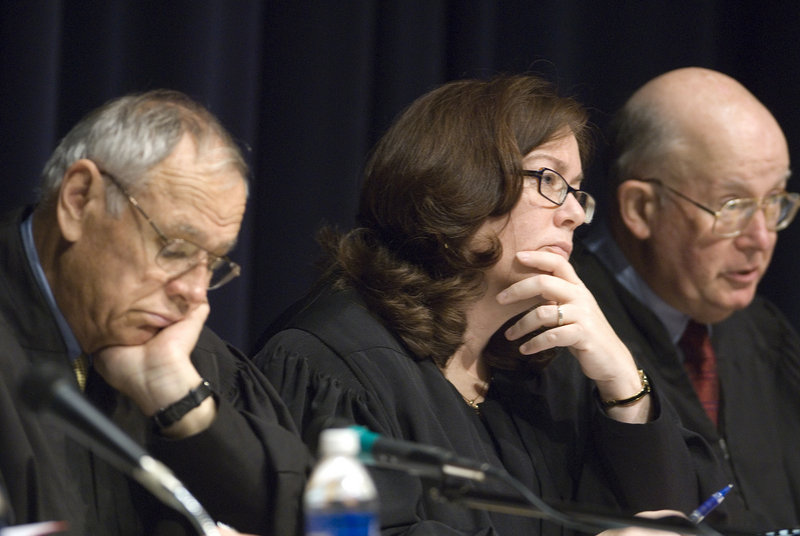Back in 2005, during a break between hearings at the State House in Augusta, Maine Chief Justice Leigh Saufley struck up a conversation with Democratic Sen. John Martin of Eagle Lake.
Both were concerned about the state’s high school students. Young people, they felt, weren’t learning enough about Maine’s legal system and the ways in which court cases can affect citizens.
Saufley and Martin also felt the state’s top judges, including the chief herself, didn’t know enough about the lives of young people and the diverse issues they deal with in different regions of Maine.
“He wondered aloud if we had ever created an opportunity for high school students to see appellate work,” Saufley recalled of the talk with Martin.
“That fairly casual kind of brainstorming conversation turned into a solid idea to take the law court on the road.”
The law court is another name for the Maine Supreme Judicial Court, and the idea generated by Saufley and Martin has evolved into a successful program now entering its sixth year.
Each fall, the Maine Supreme Judicial Court packs up its paperwork and travels to several high schools around the state. With logistical help from teachers and principals in individual schools, the court sets up in gymnasiums or auditoriums, and hears oral arguments on appeals. These are real cases from the court’s regular calendar.
But instead of looking out toward the mostly empty seats of the courthouse in Portland, the justices hear the cases in front of hundreds of students who have studied the briefs as part of their social studies coursework.
After the cases are heard, students have time to ask questions of the lawyers on each side. The justices of the supreme court then often have lunch with teachers and students.
“We get to talk with them about what is happening in their lives,” Saufley said. “It puts us in Maine’s high schools, where our kids are, and to me that is hugely rewarding.”
The travel schedule for this year was announced last week. The court will hear cases at Edward Little High School in Auburn on Oct. 4. That visit was requested by Sen. Deborah Simpson, D-Auburn, and Rep. Mike Beaulieu, R-Auburn. On Oct. 5 the court goes to Windham High School, at the request of Sen. Bill Diamond, D-Windham, and Rep. Mark Bryant, D-Windham. And on Oct. 6 the court will be at Waterville High School, at the request of Rep. Pam Trinward, D-Waterville.
Martin, an assistant professor of political science at the University of Maine at Fort Kent, said he realized the program would work when he saw the response from students and teachers at Caribou High School in 2005.
“It was a roaring success, frankly,” Martin said.
Last year, one of the court’s stops was at the University of Maine at Fort Kent. Students from four high schools in the region were bused to the university to watch the cases and participate in the question-and-answer sessions.
“You could hear a pin drop in that auditorium while the debate was going on and the court was asking its questions,” Martin said.
When the justices issued their written decisions on the cases, Martin delivered copies of the opinions to the teachers at the high schools, so the students could discuss them.
Saufley said even the cases that might appear boring, such as a land-use dispute over a dock installed by a homeowner, can generate in-depth discussions among students about individual liberties and the limits of government power.
“The whole issue of civics education, which can be so difficult to get your hands around in the larger view, has come alive in this program.”
Trevor Maxwell can be contacted at 791-6451 or at:
tmaxwell@pressherald.com
Send questions/comments to the editors.



Success. Please wait for the page to reload. If the page does not reload within 5 seconds, please refresh the page.
Enter your email and password to access comments.
Hi, to comment on stories you must . This profile is in addition to your subscription and website login.
Already have a commenting profile? .
Invalid username/password.
Please check your email to confirm and complete your registration.
Only subscribers are eligible to post comments. Please subscribe or login first for digital access. Here’s why.
Use the form below to reset your password. When you've submitted your account email, we will send an email with a reset code.